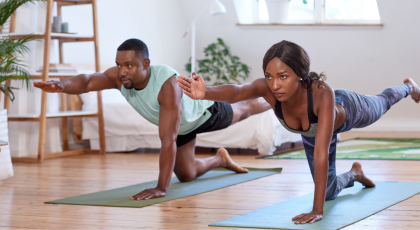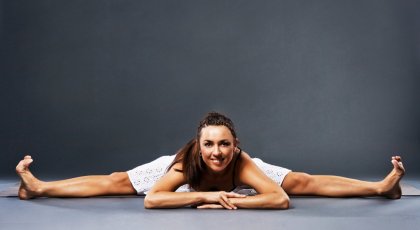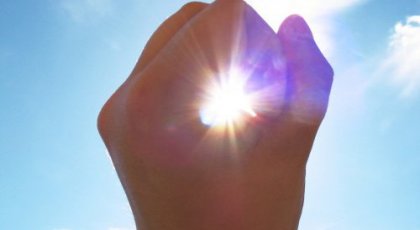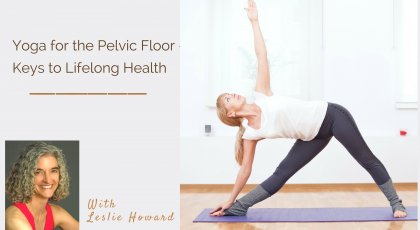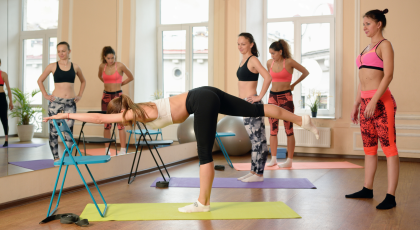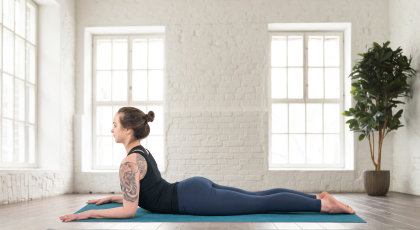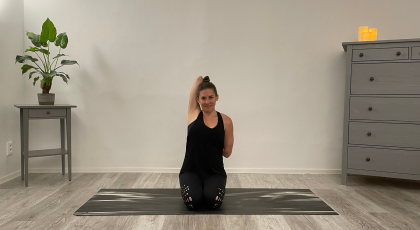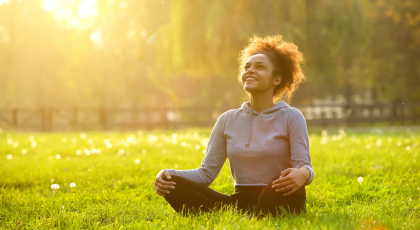View basket (0 items $0.00)

Ease for the Knees: Yoga Reduces the Pain of Osteoarthritis
A new study offers hope to people suffering from Osteoarthritis (OA). In the recent study, older women who enrolled in an 8-week Hatha yoga program not only experienced reduced pain and stiffness, but also increased function up to 12 weeks after completing the program.
Many experience some degree of stiffness and soreness as a part of aging, but for those with osteoarthritis, symptoms like chronic pain and reduced mobility can be debilitating. OA is a chronic, progressive, degenerative disease that affects nearly half of all adults over the age of 65 and nearly 30% of those 45-64. It most frequently occurs in women, often affecting the knee joints, and resulting in chronic pain, physical impairment, and a reduced quality of life.
The study, conducted at the University of Minnesota, included 36 women between the ages of 65 and 90 years (mean age 72 years and 86% white) with a diagnosis of knee OA. The women, who had no previous yoga training or current supervised exercise program, were assigned to either an 8-week Hatha yoga class (16 women) or a wait-list control group.
Participants were evaluated on a number of physical dimensions of RA (pain, stiffness and physical function) as well as sleep quality, mood disorders and quality of life at baseline, and again at 4, 8 and 20 weeks. Their recruitment and attendance rates, as well as their perceptions of program difficulty, enjoyment, and adherence to home practice were also measured.
The researchers compared the results of the yoga and wait-list control group in their initial analyses. They then combined the data from the initial yoga group and the wait-list group after both completed the yoga program to see whether all participants reported improvements immediately after completing the yoga program, and a number of weeks later.
The Hatha yoga program consisted of 60-minute yoga classes once per week for 8 weeks. Sessions included seated, standing and supine postures (asana) that were modified based on participants’ needs, as well as breathing exercises (pranayama), and meditation. Postures were designed to increase flexibility, balance and strength, and consisted of mountain pose, warrior 1 and 2 poses, tree pose, standing forward folds, reclining twists, and other postures common to beginning level yoga classes.
Study shows that yoga is feasible for older women with no previous yoga experience
Nearly 70% of participants attended 75% or more of the yoga classes. What’s more, the study had an impressive dropout rate of only 5%.
Most participants also engaged in some form of home practice. Although only 33%practiced at home for 30-minutes a day, 4-days a week as instructed, a large proportion did some home yoga practice not only during the 8-week yoga program, but also 12 weeks after it had ended. Approximately 55% practiced 1-2 days per week for some period of time, and 45% practiced 3-4 days of yoga per week.
While their practices were generally shorter than recommended, it is notable that the majority continued to practice yoga as a form of OA symptom management.
Yoga is effective for OA symptom relief
Yoga reduced pain ratings not only at the conclusion of the 8-week yoga program but also 12 weeks later. Significant differences from baseline to 8 and baseline to 20 weeks were also found for function and total “disease condition” (pain, stiffness, physical function) scores.
Quality of life ratings improved from baseline to 20 weeks and from 8 weeks to 20 weeks, suggesting that participants continued to experience benefits from practicing yoga after the program had ended. Contrary to expectation, women reported significantly less sleep quality at the 20-week follow-up. The authors question whether time of day of practice or the amount of practice may have been a factor. No effects were found for strength (chair stands), and balance.
While this study is small and preliminary, it suggests that yoga may be feasible, safe, and effective for reducing many of the key symptoms of knee OA in general, and pain in particular. This is consistent with the Arthritis Foundation (AF) recommendation that yoga may be beneficial for reducing stress and increasing joint flexibility for those with OA.
Whether you’re suffering from arthritis or hoping to prevent yourself from being one of the 50% of adults who develop the disease with age, regular yoga practice may help to keep joints and muscles limber, and keep you active well into your golden years.
 B Grace Bullock, PhD, E-RYT 500 is a psychologist, research scientist, educator, author, yoga and mindfulness expert and creator ofBREATHE: 7 Skills for Mindful Relationships. Her mission is to reduce stress, increase health and wellbeing and improve the quality of relationships. She offers classes, workshops, writing and research that combine the wisdom of applied neuroscience, psychophysiology, psychology and contemplative science and practice. Her goal is to empower individuals, groups, leaders and organizations to reduce chronic stress and increase awareness, attention, compassion, mindfulness and effective communication to strengthen relationships, release dysfunctional patterns and unlock new and healthy ways of being. Dr. Bullock is a Certified Viniyoga Therapist and Faculty at the Integrated Health Yoga Therapy (IHYT) Training program. She is the former Senior Research Scientist at the Mind & Life Institute and former Editor-in-Chief of the International Journal of Yoga Therapy. For more information see www.bgracebullock.com.
B Grace Bullock, PhD, E-RYT 500 is a psychologist, research scientist, educator, author, yoga and mindfulness expert and creator ofBREATHE: 7 Skills for Mindful Relationships. Her mission is to reduce stress, increase health and wellbeing and improve the quality of relationships. She offers classes, workshops, writing and research that combine the wisdom of applied neuroscience, psychophysiology, psychology and contemplative science and practice. Her goal is to empower individuals, groups, leaders and organizations to reduce chronic stress and increase awareness, attention, compassion, mindfulness and effective communication to strengthen relationships, release dysfunctional patterns and unlock new and healthy ways of being. Dr. Bullock is a Certified Viniyoga Therapist and Faculty at the Integrated Health Yoga Therapy (IHYT) Training program. She is the former Senior Research Scientist at the Mind & Life Institute and former Editor-in-Chief of the International Journal of Yoga Therapy. For more information see www.bgracebullock.com.
Featured Courses
